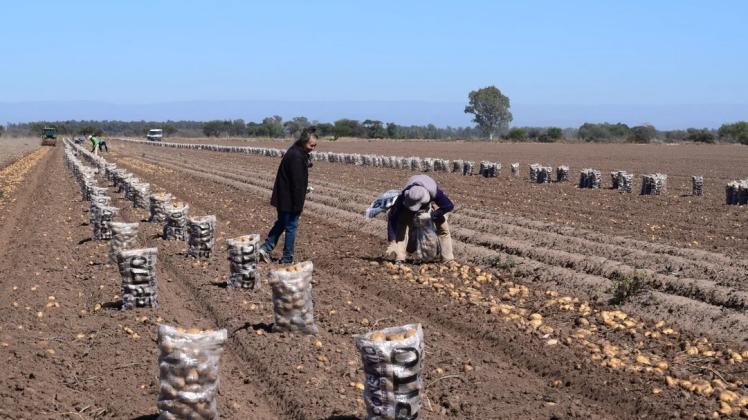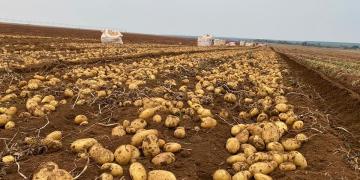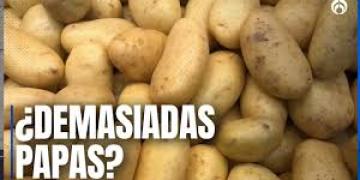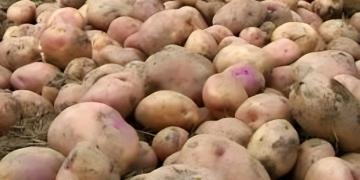Argentina (Córdoba): Potato overproduction leads to falling prices and job losses
An oversupply of the tuber, driven by a planting that reached 8,000 hectares and excellent yields, has left producers facing economic losses. The situation is being replicated in other provinces.

Potato production in Argentina is facing a new crisis due to an oversupply that has saturated markets, causing prices to plummet. Miguel Campetella, a potato producer in Córdoba and a member of the federation that represents farmers, explained that the tuber’s price is low because "there has been excessive production" in all regions, the result of an exceptional campaign.
Economic loss and skyrocketing costs
The financial situation is critical for producers, who are currently operating at a loss. While they move forward with the first harvest in the Córdoba green belt, Campetella explained to MundoAgro that "the actual cost per bag of finished potatoes has been approximately 4,000 pesos. However, producers have been selling the bag for between 2,500 and 2,800 pesos, sometimes reaching 3,000 pesos."
The producer explained that production costs are high, as many inputs are priced in dollars. The investment per hectare for the recent harvest was approximately $5,000. For the next season (spring-summer), the cost is projected to be between $7,000 and $8,000 per hectare due to the high price of the seed.
Saturation and desperate actions
Sectors linked to wholesale markets emphasize that the price problem this season has nothing to do with government measures. Juan Perlo, a member of FENAOMFRA (the National Federation of Fruit and Vegetable Market Operators), stated that what is happening is purely a "market effect." In this regard, he told MundoAgro that "the light fruit and vegetable market is severely deteriorated, with a drop in consumption and very low prices for producers."
Low prices do not cover production costs.According to potato producers, overproduction is due to the fact that more hectares were planted (8,000 more in the southeast) with the expectation that the industry could export a little more. Added to this are the "very good yields" in areas such as Córdoba, Villa Dolores, and Mendoza, creating a bottleneck with excessive production.
Market saturation has led to extreme measures. On the one hand, we see the crop being wasted, with producers in the south, including some in Buenos Aires, deciding to throw away their potatoes or not harvest them at all. This is because the cost of transporting potatoes to market (freight, commission, and expenses) amounts to about 1,500 pesos, the same price a potato from the southeast sells for today. Producers are also moving forward with the final part of the harvesting process, but at a loss. In Córdoba, for example, Campetella stated that, even if they lose money, they will finish harvesting their production so as not to replant or throw it away. However, he acknowledged that prices are very low and do not cover costs.
The potatoes produced by Campetella and other producers are destined for the so-called Fresh Market, the Córdoba Abasto (Supply Center). They are distributed to all markets in Argentina, including Córdoba, Santa Fe, Rosario, and, occasionally, the Central Market of Buenos Aires. Another phenomenon complicates the local market: the early arrival of potatoes from Tucumán, whose harvest concluded a few days ago, adds further pressure at the local level, so the oversupply is expected to continue until December.
Survival and future projections
To cope with the loss in potato production, farmers are turning to selling other crops, such as grains. Campetella commented that crop rotation leads them to grow wheat and corn to offset expenses instead of planting a new crop of potatoes.
Looking ahead to the next planting season (for harvest in December), the outlook is one of contraction. A considerable reduction in planting is already being observed in Córdoba, and a similar reduction is anticipated in the southeast, as producers lack the capital to replant and are forced to cut back.
This forced decrease in planting could have repercussions next year, raising prices, as potatoes are a product that has historically experienced years of crisis and years of recovery. Campetella concluded that extreme prices are of little use to producers: "When the price is very low, it discourages many, and they abandon these production systems, as has been happening for some time," he concluded.
Fuente:




